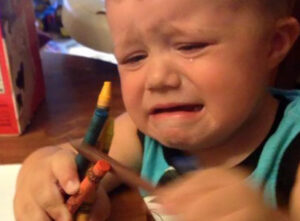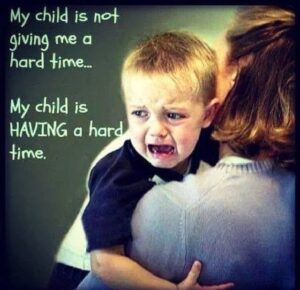HAVE YOU CRIED YET?
Adaptation is our superpower for facing life’s biggest challenges.
CRYING
Crying is useful, because at any age, crying allows us to transform; mad to sad, impatience to patience, emotion to feeling, sensations to thoughts, and ignorance to perspective – making us more attentive, thoughtful and gentler. This is the force of Adaptation. It humbles us. Specifically, Adaptation is the transformation of a big emotion like frustration into a capacity to feel. Feel what? Feel ‘futility’. Futility – the realization that my course of action is fruitless and senseless. For example, it’s futile to ignore the COVID-19 virus, or give up the fight, or return to normal. This realization is crucial because it’s the mechanism of Adaptation. “Crying is not the hurt, but the process of being ‘unhurt’.” (Solter, 1992). Crying communicates the human struggle to transform frustration into futility, to feel futility, to think about futility, embody futility, in fact be humbled by futility. Futility is like a brick wall that we cannot climb over, go around, dig under, or break through. If we cannot register futility, then we cannot break away from old habits and take a new perspective – like a post COVID world. The struggle is good, because this is the mechanism of maturation. But what if we don’t cry? Can we still embody futility to break away from old habits? Or what if we can’t stop crying? Can we take on a new perspective to keep healthy even in a post COVID world?
ADULTS AND ADAPTATION
In the news everyday, experts tell us how to adapt to this new normal, by wearing masks, washing our hands frequently, physical distancing, and avoiding indoor social settings. Who among us has adopted these new habits? Well… anyone who has had a good cry or can say out loud, “this is futile, I simply have to change, it doesn’t work the old way, I have to try something else to keep my business open and safe, there is no escaping this virus”. A lack of Adaptation to COVID-19 is the result of either getting stuck in frustration by opposing restrictions and blaming everyone else. Or getting stuck in endless crying, worry, anxiety, too frozen with fear to acknowledge ‘futility’. Who wouldn’t rather avoid this reality? But tragically, some of us will continue unchanged, until we are personally touched by death and disease. This is how Adaptation works. We hit the brick wall, even if we can’t see the wall, deny there is a brick wall, or freeze up in fear. Yet, we have no choice but to face ‘futility’ when we fall ill, our business is forced to close, or a family member dies.
LEAST ADAPTIVE
The least adaptive among us will try every ‘work around’ or ‘do over’ to avoid ‘futility’. And here is some irony – sometimes the least adaptive among us are super smart. They have so many creative, innovative ways to dodge, manipulate, or game the system, to avoid reality. This is why otherwise very intelligent kids and adults resort to desperate forms of escape like; breaking and evading the law, drinking to ease pressures, or drugging to check out of reality. This is definitely the extreme, but all too common, because there are abundant futilities in life. We don’t get that job we need. We can’t make our paycheck stretch far enough. We aren’t always successful even when we give our best effort. Plus, don’t get me started about kids who grow up feeling entitled, superior, gifted, and expect to be rescued by parents, instead of facing limits, boundaries, and restriction, yes… everyday, ordinary futilities. Adults do their children a great disservice when Adaptation is ‘spoiled’. Failure of Adaptation breeds aggression and hubris. Adaptation is a process of emotional development, meant to grow us up into mature, responsible, collaborative, beings. Emotions are designed to help us mature. Emotions seek expression, so, guaranteed we will experience frustration. Emotions seek understanding in feelings. However, we are not guaranteed to transform frustration into ‘futility’ unless we can be humbled by the brick wall. This is why, adults are tasked with not saving kids from frustration, unless this is unsafe. And why parents are also tasked with actually being a brick wall at times, to ensure Adaptation.HUMILITY AND HUBRIS
If we find ourselves in lifestyles where everyone caters to our every need, and we get to do whatever we want, whenever we want, we will suffer hubris. I do mean suffer, because if we narrow our perspective on the world so much that we believe we personally hold the full truth, we are all knowing, everyone else is wrong, we cannot make a mistake, and we have corned the market, then our emotional maturity stalls and erodes. This is a path to aggression and hubris in children & teens, easily evolving into ignoring the law, problem drinking, drugging, and ‘gaming the system’. Each of these nonadaptive paths are filled with hard knocks and will cause very hard falls back down to earth, eventually. To be clear, Adaptation generates humility not hubris. This is why the most adaptive among us are collaborative and responsible while the least adaptive among us tend to be impulsive and aggressive.
CULTURAL KNOWING
An understanding of Adaptation is not new. In fact, Charles Darwin the British biologist wrote about Adaptations for survival in the 1800s, in his studies of evolutionary biology. And long before Darwin, indigenous cultures valued life challenge for resourcefulness. For example, the Aboriginal Circle of Courage maps the importance of Adaptation in the outcome of Mastery of the environment. Yes, individuals will become overwhelmed by the challenges of life and sink into feelings of futility when efforts reach a virtual brick wall, but the wonderful outcome of Adaptation is the Mastery in becoming a more flexible problem solver because all environments require us to know the hidden rules and real constraints. Adaptation evolves competence, resilience, self-control, and personal conviction. Adults need an understanding of Adaptation because the process of adaptation is loud and messy, it evokes strong emotions when facing setbacks & suffering in life, or even when facing new responsibilities and challenges as we grow and age. There are no shortcuts for emotional development. We all face hard knocks and the reality of death and disease. But the most wonderful ‘take away’ from our COVID-19 challenge, is that we are better equipped for big challenges to come.
REFERENCES
Solter, A. (1992). Understanding tears and tantrums. Young Children, 47(4), 64-68.








